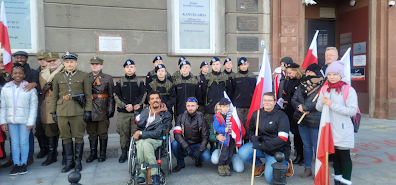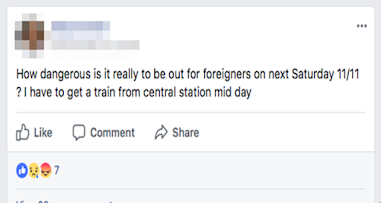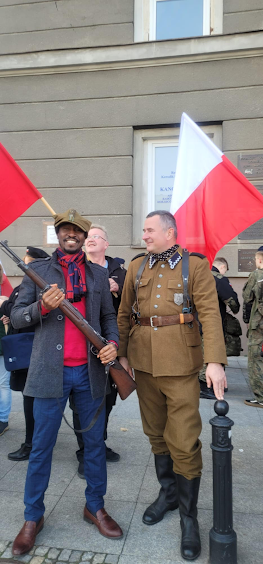CAN I GO OUT ON POLISH INDEPENDENCE DAY AS A FOREIGNER?
|
The |
question of movement and non-movement on
Polish independence day has been shrouded with lots of uncertainties depending
on who the question is thrown to. Perceptions are not reality they say but to
be forewarned is to be forearmed.
As a
foreigner living in Poland and in love with Polish Culture, this isn’t a kind
of topic one would like to write about but the author is optimistic of a "Better
Poland" where foreigners can easily celebrate with the locals (Poles) on their
Independence.
National Independence Day (Narodowe Święto Niepodległości) is a national day in Poland celebrated on 11 November to commemorate the anniversary of the restoration of Poland's sovereignty as the Second Polish Republic in 1918 from the German, Austro-Hungarian and Russian.[1] The signs of this celebration could be visible some days before 11th November as flags are being hoisted in the major and minor streets and offices. On this day, Poles all over the world both in their countries and in diaspora gather with friends to commemorate the recovery of a sovereign state.
For a much better
understanding of the context why the question has no direct traffic, it would
be necessary to understand the below terminologies that would be used in the
course of explanations:
Nationalist: A nationalist,
according to the Brittanica is one who emphasizes loyalty, devotion, or
allegiance to a nation or nation-state and holds that such obligations outweigh
other individual or group interests.[2] In the same vein, one could describe an
extreme nationalist as a fascist - movement, or regime (such
as that of the Fascisti) that exalts nation and often race above the individual
and that stands for a centralized autocratic government headed by a dictatorial leader, severe economic and social regimentation, and forcible
suppression of opposition. [3]
To explain further, for Polish nationalists, their number one enemy isn’t LGBT,
Muslims which are of course one of their problems but their primary enemy is
the westerner.[4]
Anti-Fascist: This can be simply
put to mean someone or group of people who are opposed to fascism or extreme
nationalistic tendencies.
Event: The event is
marked by series of demonstrations both in the Capital cities and in other
small cities of Poland. Certainly, the demonstrations in Warsaw has a higher
tendencies of confrontations. On this day, Nationalists all over Poland storm
the capital of Poland while making some chants which means “‘God, Honour,
and Fatherland’ and in some cases “Poland is for the Poles”.
On the other hand,
anti-fascists all over Poland organize similar demonstrations which in many
occasions lead to some violent confrontations and uproar. The nationalist groups
are so enraged in some of these confrontations that one could see them mutter
some words to the Police ‘I love and respect my country so much that I’m
going to assault a police officer’.[5]
It is so appalling
that a day that should be a happy day turns out to be “destroy your country
day” in Poland. In some of the stats, it could be seen that some officers
are usually hurt or seriously injured in an attempt to wage the confrontations.
In fact, one of the reports has it that 5 police officers were quickly rushed
to the hospital in the past.[6]
Furthermore, from
the epistemological point of view, one of the most reliable sources of
knowledge is testimonial knowledge. Thus, here are some revelations from some
news websites and some social media post and comments:
In 2011, “Forty police officers were injured and 210 people were arrested, nearly half of them said to be "anti-fascism activists" from neighbouring Germany.”[7]
Further more, here
is a sample of comments from 2017 post on facebook when a foreigner enquired to
know as well:
Five years from the above, a similar survey question was posted on 07.11.2022 in a group on social media and here are some shocking responses;
Significantly, from the big number of responses, it is also important to note that there are some foreigners that have actually joined the Poles to mark their independence.
Below, one could see a picture of the Chairman of Nigerians in Diaspora, Poland in one of those events.
 |
| Dr. Tade Omotosho (Phd) Chairman, NIDOP. |
Now the more fundamental questions arise; Until when can all these stop in Poland? Will there be an independence day
March in Poland without any iota of confrontations? What does this mean for the
future generation? Will the younger generation make this day more accommodating
for foreigners in future? These and many more are the curiosity that inspired
the author.
Finally, as we wish
the entire Poland a happy independence, one looks forward to a better
celebration that would be safe for foreigners with no confrontations and
violence.
Thus, as a foreigner in Poland, avoid all sorts of demonstrations as a routine security precaution and to mitigate associated disruptions. Leave the area at the first sign of a confrontation. Check local traffic conditions and public transport schedules for disruptions, and allow additional time to reach destinations near related events.
[1] https://en.wikipedia.org/wiki/National_Independence_Day_(Poland)
Nov 5.11.2022, 18:46
[4] https://notesfrompoland.com/2021/12/20/for-polish-nationalists-public-enemy-number-one-is-not-lgbt-or-muslims-but-the-westerner/






Indeed ,this is a massively great and well captured subject by the author. The objectivity displayed on the issues, is well on point as well as the attempt to draw valid conclusions that justifies the "STAY AT HOME" order to foreigners.
ReplyDeleteIn all, long live the Republic of Poland, long live humanity. Happy independence day in view.